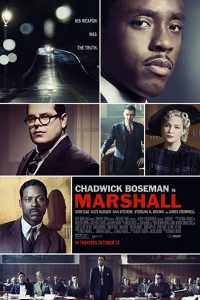REVIEW: History lesson and entertainment, ‘Marshall’ does both in effortless fashion
“Marshall” is a biopic on the life of Thurgood Marshall, America’s first African-American Supreme Court Justice. The film’s epoch is centered during a time when Marshall worked for the National Association for the Advancement of Colored People (NAACP) in the 1940s. Marshall founded, and led as Director-Counsel from 1940-1961, the NAACP’s Legal Defense Fund (NAACP LDF). During this time he focused his efforts on representing civil rights injustice in the South.

The story picks up when Marshall, played by Chadwick Boseman, receives his marching orders to go to Connecticut and represent Joseph Spell, played by Sterling K. Brown. Spell is a black chauffeur/butler who has been accused of the rape and attempted murder of local socialite Eleanor Strubing, played by Kate Hudson.
Connecticut law mandates that Marshall, an attorney practicing outside the state, must have a local lawyer submit paperwork authorizing him jurisdiction to become Spell’s attorney. Josh Gad portrays Sam Friedman, an insurance lawyer who has never held trial in criminal court, who is forced reluctantly to work with Marshall. After the sitting judge, played by James Cromwell, decides that Marshall is welcome to sit in with Spell’s counsel, but he must not utter a word in court. Here is where it gets interesting. Can a lawyer who is not well-versed in criminal law defend a man whom he first believed could be guilty? How can Marshall, a heavyweight in the courtroom for civil injustice, find a way to win when his voice is silenced?
The film does more than provide a wonderful legal thriller; the case is full of twists and turns like a legal game of chess. It approaches racism in such an honest and empathetic way, the viewer isn’t completely enraged by the community’s inability to think as individuals or their blind hatred toward those who are different just because it was the social norm at the time. You see racism from all points of view: Marshall’s POV as a fearless black man fighting for individual justice in the segregated Jim Crow South; Friedman as a Jewish man becomes aware of his differences in American society; the white community of Connecticut who fear the black man without cause; the African-American community of Connecticut living with the reality that any person of color accused of a crime is guilty for simply being black.
As the film progresses, Friedman’s views evolve on what it means to be non-white in the South as he slowly becomes an ally of such demographics. His immediate family is not on board with him taking the case, and he constantly pushes back against Marshall’s legal tactics and opinions. In his private life, members of his church look on him and his family with shame. The longer he works with Marshall, the more his eyes begin to open.
Friedman came to understand that here was a man, Marshall, who leaves his family in the more progressive states to head down South where he could be lynched for looking at a white person the wrong way and no one would care. A man whose life is constantly threatened, intelligence impugned and forced to face several roadblocks in the courtroom with juries who do not represent the peers that he defends. Throughout all of this, he remains vigilant and grounded in his beliefs that he can change the world using the law, the same law that was not created equally for minorities or with them even in mind.
The direction in which the film goes is crisp and refreshing. Although it contains a few liberties for entertainment value, the film does mirror the case fairly close. In the midst of all that was bad, the viewer has the opportunity to see an unlikely friendship flourish. This human and heroic tale of Marshall and Friedman is performed excellently. “Marshall” is a film that entices conversation and leaves one feeling hopeful for the future, even more so in today’s time because not only of how far we have come, but also because of the work that still needs to be done.

